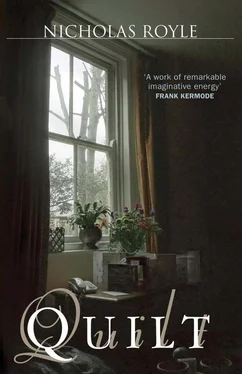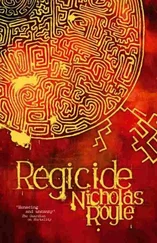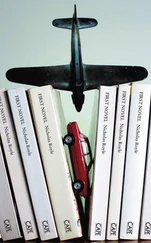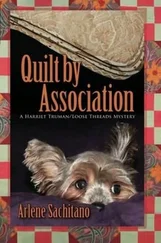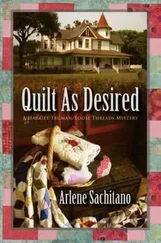Nicholas Royle - Quilt
Здесь есть возможность читать онлайн «Nicholas Royle - Quilt» весь текст электронной книги совершенно бесплатно (целиком полную версию без сокращений). В некоторых случаях можно слушать аудио, скачать через торрент в формате fb2 и присутствует краткое содержание. Год выпуска: 2011, Издательство: Myriad Editions, Жанр: Современная проза, на английском языке. Описание произведения, (предисловие) а так же отзывы посетителей доступны на портале библиотеки ЛибКат.
- Название:Quilt
- Автор:
- Издательство:Myriad Editions
- Жанр:
- Год:2011
- ISBN:нет данных
- Рейтинг книги:4 / 5. Голосов: 1
-
Избранное:Добавить в избранное
- Отзывы:
-
Ваша оценка:
- 80
- 1
- 2
- 3
- 4
- 5
Quilt: краткое содержание, описание и аннотация
Предлагаем к чтению аннотацию, описание, краткое содержание или предисловие (зависит от того, что написал сам автор книги «Quilt»). Если вы не нашли необходимую информацию о книге — напишите в комментариях, мы постараемся отыскать её.
Quilt — читать онлайн бесплатно полную книгу (весь текст) целиком
Ниже представлен текст книги, разбитый по страницам. Система сохранения места последней прочитанной страницы, позволяет с удобством читать онлайн бесплатно книгу «Quilt», без необходимости каждый раз заново искать на чём Вы остановились. Поставьте закладку, и сможете в любой момент перейти на страницу, на которой закончили чтение.
Интервал:
Закладка:

The house is inconceivably empty. There is so much to do it seems more logical to leave again, evade the emptiness and perhaps, when the bright day is done, return in the cool of summer dusk. They drive down to the coast and walk up a cliff-path they have taken once before. She feels paralysed. She can only stay a fortnight. In that period she will do everything she can to make things less unbearable. But there is so much to do. He doesn’t tell her about the mimosa, fearful of what she would think. The order is impossible to disentangle. There are all things at once. There is the phoning, the labyrinth of calls, family, friends, former work colleagues and of course official bodies, official bodies of death, the hospital to arrange the collection of clothing and other personal items, the doctor to thank her for her help but will he ever make that call, what help, she was so pleasant and clarifying and let him die, the coroner, the man who will actually be carrying out the post-mortem, the people who organise his father’s pension, organised, that yawning gap of tenses keeps coming over, gone, no longer to be organised, the bank, the electricity company, the phone company. And then there is the incredible world of the cottage, dead and surviving, stuffed with the past now present, the present now past, in a convulsion of lunatic tranquillity. It’s an impossible coincidence, at once a celestial creaking galley, quiet as the moon, and a mine turned upside down with all its shafts, riches and debris suddenly at the surface and no one in charge. No one and nothing is in charge. That’s the true madness, as Polonius should have pointed out, had he not been a father himself: the sudden and absolute obliteration of authority. Not that his father was authoritarian, on the contrary he was the least a man could be, but that makes the chasm all the more appalling, into which he now sees he has begun falling. It’s not a question of a yes or no regarding this or that thought or desire, this instant of decision or that impulse to act, it’s the basis of everything: it’s the dissolution of law, truth, rationality, sense, logic, light itself. That’s the wizening mimosa, the madness of the truth, seeping into view before the nurse had even told him what had happened, the magisterial, blankety trick-photography of the changing of the light.

The ray is stationary, lurking in the nether regions. It’s nature’s way, awry. The sway of nature makes for this singular, this solitary, this ray. There’s no getting around it. It’s necessarily this one. Irreparably, irrecoverably: it’s a ray of one’s own. How admirably now each eye is raised, its marvellously wide vision shielded by the lid that, traversing the eyeball as the ray buries itself in the substrate, stops foreign bodies (sand, mud, gravel) entering! Like a spell as yet uncast: Operculum pupillare! Even through a glass darkly the ray sees brilliantly, like an underwater cat. In submarine gloom guanine crystals make up tiny mirror-like plates that become visible as the light is fading, just at the outer edge of each eye. How inspirationally it blows and plays, the spiracle or blow-hole behind each eye pumping water like a heart as it lies, almost unrecognisably, on the sandy bottom! On it, in it, what you will. Everything about this brainy creature is so starkly strange, back-to-front and upside down, trapeze artist of deep time, feelings flattened, gravity in chaos. And how charmingly the marine savagery of its eating habits is occluded, since the crafty mouth is concealed, underneath! How readily it would ravage a Red Riding Hood granny, its mouth packed with tooth-plates, arranged in rows! No sooner does a tooth go missing, grinding up its hapless prey, than a new one is lined up in front of it: lifelong self-renewing spray! the original dragon’s army! The ray is stationary even when it moves, shooting through water at unnerving speed, propelled by the pectoral fins that form the hem of the body, close to complete circularity, as the axis of the body remains unaltering. How quickly its lurking quivers into larking!

They have to start somewhere and next day, as if the phone calls are staccato punctuation to a death-sentence uncurling in their ears, they get to work tidying up the downstairs, beginning with the junk mail. Out of order, over the edge, already perhaps too late, he realises there will need to be a reception after the funeral, and then before the reception there will need to be the funeral. It is as if they have lost basic forms of co-ordination, removing or replacing things in the dark, bumping into one another, making love like singed moths. And there cannot be a funeral until there has been a post-mortem. He talks to a voice, in the nearest city, about the body of his father. He has not seen, he will never see the man who performs the post-mortem, the one who sees, but he hears him. As if he might just as readily be talking about the delivery of a washing machine, the pathologist confirms that his father had a knock on the head.
— Which must be due to some fall, the voice concludes (as if he doesn’t know anything about what happened in the hospital, as if there was no communication between the two places, as if he would even be required to perform a post-mortem otherwise, the false dog, but)
— In any case, the voice says, this small gash would not account for cause of death.
The cause, the cause. Is it in a good cause, he wants to press, in a counter to all this pathology, to speak of cause of death? To my ear, your very voice is a lost cause, sir. Pause. In which the cause of the pause and the pause of the cause and the pause of the cause of the pause are all in abeyance, without pause or cause, for several days. And then he hears again from this faceless voice with his father’s body: the cause of death is two, two causes, and the two causes divide into three, just in case one or two wouldn’t suffice, and over the phone they are specified and the words fizzle and faint away, implausible as an electric brae. But they duly reappear, set in the watery strangeness of writing, just a week, less than a little week afterwards, on the death certificate: I. (a) Ischaemic heart disease (b) Coronary artery atheroma; II. Carcinomatosis due to carcinoma of the large bowel.
They collect this from the local register office one bright morning. The blank officious woman taps at her computer, then prints out the incredible document. Laugh or cry, flick a coin, or watch it melt abruptly in mid-air, it’s the hilarity, the nauseatingly absurd handing over of coins, bits of money to acquire more than one copy of the same piece of paper, the death certificate wanted dead or alive. For everyone wants sight of the death certificate, a certified copy, not a photocopy but a certified copy, triggering another chain reaction of phone calls and correspondence: the undertaker, the bank, the pension company, the solicitor’s office holding the will, and the vicar to conduct a funeral and the undertaker to liaise with the vicar and the body to be returned to the neighbouring town where his father can, after a week, be viewed in the chapel of rest (When you feel ready, sir), and a time established for the interring and therefore a time for the reception, not wake but reception, like a hotel or motor garage, report to reception, like taking or offering receipt, of what, by whom and how, like nothing. This is to happen at the house, a few minutes’ walk up the lane from the churchyard where his father is to be buried in a double grave already assigned alongside his beloved wife dead twenty-eight months earlier.
Читать дальшеИнтервал:
Закладка:
Похожие книги на «Quilt»
Представляем Вашему вниманию похожие книги на «Quilt» списком для выбора. Мы отобрали схожую по названию и смыслу литературу в надежде предоставить читателям больше вариантов отыскать новые, интересные, ещё непрочитанные произведения.
Обсуждение, отзывы о книге «Quilt» и просто собственные мнения читателей. Оставьте ваши комментарии, напишите, что Вы думаете о произведении, его смысле или главных героях. Укажите что конкретно понравилось, а что нет, и почему Вы так считаете.
